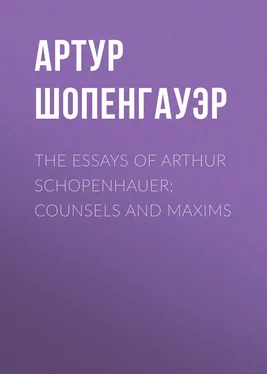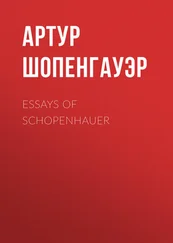Артур Шопенгауэр - The Essays of Arthur Schopenhauer; Counsels and Maxims
Здесь есть возможность читать онлайн «Артур Шопенгауэр - The Essays of Arthur Schopenhauer; Counsels and Maxims» — ознакомительный отрывок электронной книги совершенно бесплатно, а после прочтения отрывка купить полную версию. В некоторых случаях можно слушать аудио, скачать через торрент в формате fb2 и присутствует краткое содержание. Жанр: Философия, literature_19, foreign_antique, foreign_prose, на английском языке. Описание произведения, (предисловие) а так же отзывы посетителей доступны на портале библиотеки ЛибКат.
- Название:The Essays of Arthur Schopenhauer; Counsels and Maxims
- Автор:
- Жанр:
- Год:неизвестен
- ISBN:нет данных
- Рейтинг книги:3 / 5. Голосов: 1
-
Избранное:Добавить в избранное
- Отзывы:
-
Ваша оценка:
- 60
- 1
- 2
- 3
- 4
- 5
The Essays of Arthur Schopenhauer; Counsels and Maxims: краткое содержание, описание и аннотация
Предлагаем к чтению аннотацию, описание, краткое содержание или предисловие (зависит от того, что написал сам автор книги «The Essays of Arthur Schopenhauer; Counsels and Maxims»). Если вы не нашли необходимую информацию о книге — напишите в комментариях, мы постараемся отыскать её.
The Essays of Arthur Schopenhauer; Counsels and Maxims — читать онлайн ознакомительный отрывок
Ниже представлен текст книги, разбитый по страницам. Система сохранения места последней прочитанной страницы, позволяет с удобством читать онлайн бесплатно книгу «The Essays of Arthur Schopenhauer; Counsels and Maxims», без необходимости каждый раз заново искать на чём Вы остановились. Поставьте закладку, и сможете в любой момент перейти на страницу, на которой закончили чтение.
Интервал:
Закладка:
All society necessarily involves, as the first condition of its existence, mutual accommodation and restraint upon the part of its members. This means that the larger it is, the more insipid will be its tone. A man can be himself only so long as he is alone; and if he does not love solitude, he will not love freedom; for it is only when he is alone that he is really free. Constraint is always present in society, like a companion of whom there is no riddance; and in proportion to the greatness of a man's individuality, it will be hard for him to bear the sacrifices which all intercourse with others demands, Solitude will be welcomed or endured or avoided, according as a man's personal value is large or small, – the wretch feeling, when he is alone, the whole burden of his misery; the great intellect delighting in its greatness; and everyone, in short, being just what he is.
Further, if a man stands high in Nature's lists, it is natural and inevitable that he should feel solitary. It will be an advantage to him if his surroundings do not interfere with this feeling; for if he has to see a great deal of other people who are not of like character with himself, they will exercise a disturbing influence upon him, adverse to his peace of mind; they will rob him, in fact, of himself, and give him nothing to compensate for the loss.
But while Nature sets very wide differences between man and man in respect both of morality and of intellect, society disregards and effaces them; or, rather, it sets up artificial differences in their stead, – gradations of rank and position, which are very often diametrically opposed to those which Nature establishes. The result of this arrangement is to elevate those whom Nature has placed low, and to depress the few who stand high. These latter, then, usually withdraw from society, where, as soon as it is at all numerous, vulgarity reigns supreme.
What offends a great intellect in society is the equality of rights, leading to equality of pretensions, which everyone enjoys; while at the same time, inequality of capacity means a corresponding disparity of social power. So-called good society recognizes every kind of claim but that of intellect, which is a contraband article; and people are expected to exhibit an unlimited amount of patience towards every form of folly and stupidity, perversity and dullness; whilst personal merit has to beg pardon, as it were, for being present, or else conceal itself altogether. Intellectual superiority offends by its very existence, without any desire to do so.
The worst of what is called good society is not only that it offers us the companionship of people who are unable to win either our praise or our affection, but that it does not allow of our being that which we naturally are; it compels us, for the sake of harmony, to shrivel up, or even alter our shape altogether. Intellectual conversation, whether grave or humorous, is only fit for intellectual society; it is downright abhorrent to ordinary people, to please whom it is absolutely necessary to be commonplace and dull. This demands an act of severe self-denial; we have to forfeit three-fourths of ourselves in order to become like other people. No doubt their company may be set down against our loss in this respect; but the more a man is worth, the more he will find that what he gains does not cover what he loses, and that the balance is on the debit side of the account; for the people with whom he deals are generally bankrupt, – that is to say, there is nothing to be got from their society which can compensate either for its boredom, annoyance and disagreeableness, or for the self-denial which it renders necessary. Accordingly, most society is so constituted as to offer a good profit to anyone who will exchange it for solitude.
Nor is this all. By way of providing a substitute for real – I mean intellectual – superiority, which is seldom to be met with, and intolerable when it is found, society has capriciously adopted a false kind of superiority, conventional in its character, and resting upon arbitrary principles, – a tradition, as it were, handed down in the higher circles, and, like a password, subject to alteration; I refer to bon-ton fashion. Whenever this kind of superiority comes into collision with the real kind, its weakness is manifest. Moreover, the presence of good tone means the absence of good sense .
No man can be in perfect accord with any one but himself – not even with a friend or the partner of his life; differences of individuality and temperament are always bringing in some degree of discord, though it may be a very slight one. That genuine, profound peace of mind, that perfect tranquillity of soul, which, next to health, is the highest blessing the earth can give, is to be attained only in solitude, and, as a permanent mood, only in complete retirement; and then, if there is anything great and rich in the man's own self, his way of life is the happiest that may be found in this wretched world.
Let me speak plainly. However close the bond of friendship, love, marriage – a man, ultimately, looks to himself, to his own welfare alone; at most, to his child's too. The less necessity there is for you to come into contact with mankind in general, in the relations whether of business or of personal intimacy, the better off you are. Loneliness and solitude have their evils, it is true; but if you cannot feel them all at once, you can at least see where they lie; on the other hand, society is insidious in this respect; as in offering you what appears to be the pastime of pleasing social intercourse, it works great and often irreparable mischief. The young should early be trained to bear being left alone; for it is a source of happiness and peace of mind.
It follows from this that a man is best off if he be thrown upon his own resources and can be all in all to himself; and Cicero goes so far as to say that a man who is in this condition cannot fail to be very happy — nemo potest non beatissimus esse qui est totus aptus ex sese, quique in se uno ponit omnia. 16 16 Paradoxa Stoidorum : II.
The more a man has in himself, the less others can be to him. The feeling of self-sufficiency! it is that which restrains those whose personal value is in itself great riches, from such considerable sacrifices as are demanded by intercourse with the world, let alone, then, from actually practicing self-denial by going out of their way to seek it. Ordinary people are sociable and complaisant just from the very opposite feeling; – to bear others' company is easier for them than to bear their own. Moreover, respect is not paid in this world to that which has real merit; it is reserved for that which has none. So retirement is at once a proof and a result of being distinguished by the possession of meritorious qualities. It will therefore show real wisdom on the part of any one who is worth anything in himself, to limit his requirements as may be necessary, in order to preserve or extend his freedom, and, – since a man must come into some relations with his fellow-men – to admit them to his intimacy as little as possible.
I have said that people are rendered sociable by their ability to endure solitude, that is to say, their own society. They become sick of themselves. It is this vacuity of soul which drives them to intercourse with others, – to travels in foreign countries. Their mind is wanting in elasticity; it has no movement of its own, and so they try to give it some, – by drink, for instance. How much drunkenness is due to this cause alone! They are always looking for some form of excitement, of the strongest kind they can bear – the excitement of being with people of like nature with themselves; and if they fail in this, their mind sinks by its own weight, and they fall into a grievous lethargy. 17 17 It is a well-known fact, that we can more easily bear up under evils which fall upon a great many people besides ourselves. As boredom seems to be an evil of this kind, people band together to offer it a common resistance. The love of life is at bottom only the fear of death; and, in the same way, the social impulse does not rest directly upon the love of society, but upon the fear of solitude; it is not alone the charm of being in others' company that people seek, it is the dreary oppression of being alone – the monotony of their own consciousness – that they would avoid. They will do anything to escape it, – even tolerate bad companions, and put up with the feeling of constraint which all society involves, in this case a very burdensome one. But if aversion to such society conquers the aversion to being alone, they become accustomed to solitude and hardened to its immediate effects. They no longer find solitude to be such a very bad thing, and settle down comfortably to it without any hankering after society; – and this, partly because it is only indirectly that they need others' company, and partly because they have become accustomed to the benefits of being alone.
Such people, it may be said, possess only a small fraction of humanity in themselves; and it requires a great many of them put together to make up a fair amount of it, – to attain any degree of consciousness as men. A man, in the full sense of the word, – a man par excellence – does not represent a fraction, but a whole number: he is complete in himself.
Интервал:
Закладка:
Похожие книги на «The Essays of Arthur Schopenhauer; Counsels and Maxims»
Представляем Вашему вниманию похожие книги на «The Essays of Arthur Schopenhauer; Counsels and Maxims» списком для выбора. Мы отобрали схожую по названию и смыслу литературу в надежде предоставить читателям больше вариантов отыскать новые, интересные, ещё непрочитанные произведения.
Обсуждение, отзывы о книге «The Essays of Arthur Schopenhauer; Counsels and Maxims» и просто собственные мнения читателей. Оставьте ваши комментарии, напишите, что Вы думаете о произведении, его смысле или главных героях. Укажите что конкретно понравилось, а что нет, и почему Вы так считаете.












